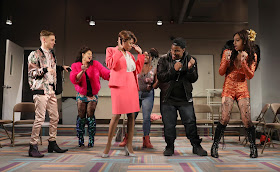"Its Title Fits"

 Philip Dawkins’s lively, touching, if imperfect, comedy, now in an MCC production at the Lucille Lortel following its premiere at Chicago’s Northlight Theatre, rocks a colorful variation of a familiar format: a teacher (usually gifted) meets a disparate class of socially or educationally challenged students, helps them overcome their difficulties via unorthodox ideas, is briefly stymied by personal or bureaucratic problems, and inspires his or her students to discover themselves and become the best they can be. Think Dead Poets Society, The Primary English Class, History Boys, Freedom Writers, School of Rock, or To Sir with Love, and so on and so forth.
Philip Dawkins’s lively, touching, if imperfect, comedy, now in an MCC production at the Lucille Lortel following its premiere at Chicago’s Northlight Theatre, rocks a colorful variation of a familiar format: a teacher (usually gifted) meets a disparate class of socially or educationally challenged students, helps them overcome their difficulties via unorthodox ideas, is briefly stymied by personal or bureaucratic problems, and inspires his or her students to discover themselves and become the best they can be. Think Dead Poets Society, The Primary English Class, History Boys, Freedom Writers, School of Rock, or To Sir with Love, and so on and so forth. |
| Kelli Simpkins, Sandra Caldwell. Photo: Joan Marcus. |
 |
| Michael Lorz,, Hailie Sahar, Sandra Caldwell, Lauren F. Walker, Michael David Baldwin, Jojo Brown. Photo: Joan Marcus. |
Mama (Sandra Caldwell), hired by the mannish female supervisor D (Kelli Simpkins)—who warns her that “tranny” is a politically incorrect expression—is a classy, 67-year-old who transitioned at 48 and considers herself “living history” for her students to learn from. She’s immaculately dressed and coiffed (in a stylish wig), beautifully spoken, physically graceful, a role model for the principals of politesse; in this context, it’s a matter of knowing how to put people at their ease by being charming. The valuable payoff is mutual love and respect.
 |
| Jojo Brown, Michael Lorz. Photo: Joan Marcus. |
Mama’s pedagogical bible, which she totes to class until it’s stolen, is a book of Emily Post’s rules on social behavior. The class, on the other hand, is a wild assortment of loud, raucous, foul-mouthed, self-centered young people whose idiosyncratic clothing, hair, and makeup doesn’t necessarily signal their biological or preferred gender identity.
 |
| Marquise Vilson, Mary Irene Diven. Photo: Joan Marcus. |
The characters allow for different ways of envisioning them, apparent when one studies photos of the Northlight production. As seen in New York, Beta (Marquise Vilson) is a bearded, shaven-headed African American, wearing shades and garbed in gangsta black; Logan (Michael Lorz) is a pencil-thin, pretty, teenage blond in skintight slacks, walking the high wire between boy and girl; Ariella (Hailie Sahar) is a bosomy, gaudily dressed ho in ultra-flashy kinky boots; Lady (Marky Irene Diven) is long-haired, frumpy, and white, unable to determine their (the proper pronoun here) identity; Jonelle (Jojo Brown) is tall and gangly in sequined minis with black angel wings; Donnie (Michael David Baldwin) and Victoria (Lauren F. Walker) are a cisgender black couple struggling, among other things, with issues of mutual respect. MCC’s perfect casting, which respects the identities of its actors, is likely to offer some surprises.
 |
| Lauren F. Walker, Sandra Caldwell. Photo: Joan Marcus. |
For all the students’ initial misbehavior and rudeness, Mama’s steely resolve to wrangle them manages to tame their more egregious excesses; we grow to love their eccentricities and admire how they address the difficulties they face. As in most such stories, Mama’s methods bring her into conflict with the LBGTQ establishment, D, when a negative newspaper interview with one of the students appears. The contrast in these characters’ views offers the play’s most compelling insights. Mama even has a medical episode that allows for a classically schmaltzy conclusion in her hospital room.
 |
| Sandra Caldwell, Hailie Sahar. Photo: Joan Marcus. |
Charm is classic feel-good territory where you end up wanting to cuddle folks you may first have thought of as oddities, the kind of extreme people who, unless you belong to the club, most of us are unlikely to encounter except when sharing public transport.
Arnulfo Maldonado’s institutional classroom set is well lit by Ben Stanton, who gets to show his tricks in the fantasy bits, while Oana Botez’s striking costumes go all out to capture each character’s stylistic individuality. Will Davis’s upbeat direction enlivens the production, which includes some wonderful fantasy sequences, like an imagined tea party dance, and a hospital dream scene. He’s unable, however, to solve an awkward staging problem when he has two people exit into a doorless oblivion at left so they won’t run into an eavesdropper listening at the only door.
Mama turns the spotlight at one point on the word “fabulous,” but you need only watch Sandra Caldwell’s exceptional, award-level performance to understand its meaning. She does everything right, bringing heart-tugging humanity to the empathetic Mama, maintaining consistent naturalness, and never faltering in the expression of truth, strength, and vulnerability.
Charm’s formulaic and predictable storytelling (including hoary devices like that eavesdropping bit) require polite critical wrist slaps. They don't, however, diminish the play's big heart or lower its huge entertainment value, especially as expressed in the exemplary ensemble’s shining performances. Each actor makes us feel that, in their futures, their characters will add something to the charm bracelet of life.
 |
| Sandra Caldwell. Photo: Joan Marcus. |
OTHER VIEWPOINTS:
Lucille Lortel Theatre
121 Christopher St., NYC
Through October 8
